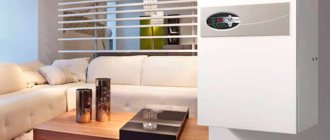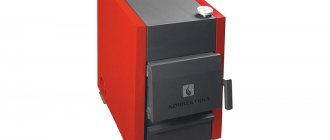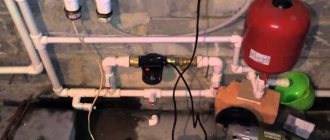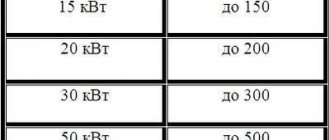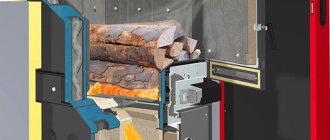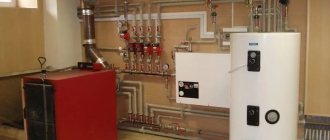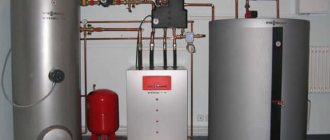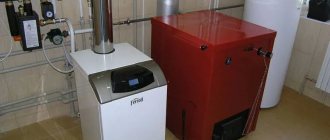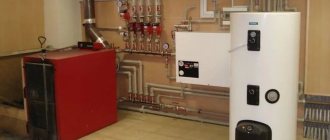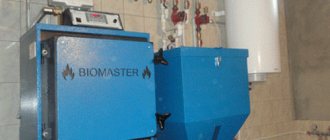Properly choosing boilers for heating a private home is necessary for installing an autonomous system. It is heating equipment that will provide housing with heat and hot water. It will create the microclimate necessary for human habitation. In addition, it will work flawlessly. It is so?
We will tell you how to buy a boiler that will meet your requirements and wishes. We have analyzed all the criteria that you should pay attention to when looking through catalogs of online stores or an assortment of specialized retail outlets. Problems that you may encounter before and after purchase are listed.
Key parameters for choosing a boiler
Even prepared buyers sometimes find it difficult to navigate the huge assortment. I would like the boiler to be both affordable and of high quality. Heating installations differ according to the type of fuel used to ensure their operation.
- Solid fuel.
- Liquid fuel.
- Gas.
- Electrical.
- Universal.
Before purchasing a boiler, you need to consider all the pros and cons. Carry out a comparative review and determine which boiler is right for your building. The device must combine: safety, reliability and durability.
In order not to make a mistake and not throw money away and then regret a thoughtless purchase, you need to be responsible when choosing equipment.
Selection of heating boiler by price, power, combustion chamber
Dear users of our resource, if this is your first time on our website looking for a heating boiler and you don’t know what kind of boiler you need, then we recommend using the heating boiler power calculation.
Here you can choose a heating boiler based on the fact that you already know what kind of boiler you need, the power of the boiler, where the boiler will be mounted: on the wall or whether it will be floor-mounted and, of course, taking into account the resources available for this. For selection, we suggest you indicate the criteria you need.
More detailed information can be obtained by clicking on the appropriate link as a result of selecting a heating boiler or by calling in Moscow +7(495)48-132-48
Criteria for selecting a heating boiler:
- boiler price
- number of circuits (single-circuit or double-circuit)
- boiler type (wall-mounted or floor-standing)
- combustion chamber (open or closed)
- type of coolant (gas, diesel, electricity)
- boiler power
- boiler voltage (220V, 380V, 220/380V)
In order to find out more detailed information about heating boilers, here is the classification of heating boilers:
by installation method (by installation location):
- floor (cast iron or steel)
- wall-mounted (mounted) (usually run on gas)
by type of energy carrier:
- liquid fuels (diesel, kerosene, fuel oil, etc.)
- solid fuel (solid fuel: firewood, coal, coke, sawdust, fuel briquettes, etc.)
- gas (liquefied gas, natural gas)
- electrical (the energy carrier can be electricity)
- universal (multi-fuel, combined) (energy carriers can be different, depending on the heating boiler)
by number of circuits:
- single-circuit, such boilers are intended only for heating; as a rule, such boilers have the ability to connect an external storage boiler.
- double-circuit (one circuit for heating, the second for hot water supply)
by combustion chamber:
- open, air, namely oxygen for combustion, is taken from the place where the boiler is installed. It must be well ventilated.
- closed, the air is taken, as a rule, from the outside, although such boilers can be converted so that the air is taken from the place where it is installed. Boilers with a closed combustion chamber, in turn, differ from each other in the method of air intake and smoke removal. Those. or with a separate smoke removal system, when two “pipes” approach the boiler - one of which supplies air, and the other removes combustion products. In boilers with a coaxial chimney, which are more compact, there is one pipe inside another. Air is supplied through one, smoke removal is carried out through the other.
according to the material of the main heat exchanger:
by type of burner (burner device):
- inflatable (fan) burner (gas or liquid)
- atmospheric burner (gas)
according to the method of coolant movement:
- natural circulation / gravity (without pump)
- forced circulation (with pump)
according to the amount of voltage required for operation:
by type of coolant:
- liquid (water or antifreeze)
- steam
- air
How to choose a boiler for a private home
When buying a heating device, follow the recommendations.
- Understand absolutely all the details and advantages of the models in question, and also familiarize yourself with the disadvantages.
- Calculate the best cost, volume and power of equipment for your home.
- Focus on the number of contours.
- Plan the area where you plan to install the boiler.
For a small room, it is unwise to buy a large and bulky unit.
Why contact a specialist?
We found out that buying a boiler from the square is wrong. It is important to consider the heat loss of the building. For example, a house of 300 m² can be heated by a 15 kW boiler if all surfaces are thoroughly insulated. And a house of 150 m² may require 30 kW equipment with thin walls and uninsulated roof and ventilation.
There are hundreds of standards and regulations on this topic, there are dozens of formulas. Sometimes one thing contradicts the other, or standards change and it is difficult for a non-professional to understand whether these requirements are relevant. You can calculate all this armed with a stack of reference books. Or contact specialists who will make accurate calculations in the program and explain all the details. They will help you save money, time, and model an efficient home heating system.
How to calculate the power of the boiler
One of the main rules that everyone needs to remember: saving on the development of design documentation for future heating equipment will benefit the customer. In this case, you need to trust a good, qualified master.
Which will select the type, size, power of the boiler. When contacting an expert, be sure that the price of the boiler and other equipment will be lower, and there will be fewer problems in the future.
The performance of the heating unit is selected using the following ratio: 0.1 kW per 2 square meters. living space.
When calculating the performance of a boiler for a heating system, consider the following factors.
- How many people live in the housing and will use the boiler?
- Building materials used for housing construction and interior decoration.
- Climatic region.
- Number of windows and doors in rooms.
- Number of storeys.
Thanks to modern engineering technologies, heat loss is significantly lower than just a couple of years ago, and productivity is higher.
Why you shouldn’t choose a boiler with too much power reserve
With a lack of heating performance, everything is very clear: the heating system simply will not provide the desired temperature level even with continuous operation. However, as we have already mentioned, excess power can also become a serious problem, the consequences of which are:
- lower efficiency and increased fuel consumption, especially on one- and two-stage burners that are not able to smoothly modulate productivity;
- frequent clocking (on/off) of the boiler, which disrupts normal operation and reduces the burner life;
- simply a higher cost of the boiler unit, given that the performance for which the increased payment was made will not be used;
- often greater weight and larger dimensions.
When excessive heat output is still appropriate
The only reason to choose a version of the boiler that is much larger than needed, as we have already mentioned, is to use it in conjunction with a buffer tank. A buffer tank (also a heat accumulator) is a storage tank of a certain volume filled with coolant, the purpose of which is to accumulate excess thermal power and subsequently distribute it more rationally for the purpose of heating a house or providing hot water supply (DHW).
For example, a heat accumulator is an excellent solution if the performance of the DHW circuit is insufficient or when a solid fuel boiler cycles, when the fuel, when burned, releases maximum heat, and after burning out the system quickly cools down. Also, a heat accumulator is often used in conjunction with an electric boiler, which heats the tank during the period of a reduced night electricity tariff, and during the day the accumulated heat is distributed throughout the system, maintaining the desired temperature for a long time without the participation of the boiler.
InstructionsBoilers
Advantages of solid fuel boilers
How to select a boiler for heating a building if there is no access to the gas line and the electrics are unprofitable? Throughout almost the entire territory of the Russian Federation, solid fuel is considered more easily accessible.
This can explain the enormous popularity of solid fuel boilers. In models of this type, it is impossible to burn everything that burns, but only what is provided for by the specific equipment.
The advantages of the units include:
- Affordable price.
- Autonomy.
- Superior energy efficiency.
Boilers should be filled with fuel. Approximately 7-16 hours the compartment should be filled with firewood or waste. Systems have now been developed that supply logs to the boiler automatically, but these variations are intended for large organizations or firms.
How to calculate power taking into account heat loss?
What is heat loss? Let’s say it’s -20 degrees outside, but the average temperature at home is +20 degrees. These quantities are balanced through the exchange of energy. Heat losses occur. The amount of heat loss under severe weather conditions helps to calculate the boiler power with high accuracy.
Step 1
Heat loss is determined by the formula: Q = Q roof + Q walls + Q floor + Q doors + Q windows .
Where the extreme value of Q is the heat loss of each surface of the house.
Each Q value is calculated using the formula: Q = S * T / R
Where Q is heat loss in W, S is the area of a specific surface in m², T is the difference between street and room temperatures in degrees, R is reference data on thermal resistance by type of material.
Step 2
This formula additionally includes involuntary heat loss through cracks, ventilation, exhaust hoods, opening doors and ventilation through windows. For independent calculations without a program, an additional 5% of the total leakage figure is added.
Step 3
Next we move on to determining the boiler power. There are only two formulas to choose from:
Rkot. = ( S room * P beat ) / 10 , where Rkot. — boiler power, Sroom. - the total area of rooms in the house where heating is planned, Pud. — specific power according to climate conditions.
Rkot. = ( Q losses * S from area ) / 100, where Rkot. - boiler power, Qloss - heat loss, Sot. area – total area of heated rooms.
Step 4
For an electric and gas boiler, you can use the table to check:
| Option | House area, m² | Heating, kW | Recommended number of devices | How many people live | DHW boiler, l/kW | Warm floor, m² | Warm floor, kW | Total power | Boiler power | Standard range of boilers, Cat, Ns/A/Nd |
| 1 | 2 | 3 | 4 | 5 | 6 | 7 | 8 | 9 | 10 | 11 |
| 2 | 150 | 19 | 10 | 4 | 100/28 | 16 | 0,75 | 48 | 28 | 28/27/28 |
| 3 | 200 | 22 | 11 | 4 | 100/28 | 20 | 1 | 51 | 28 | 28/27/28 |
| 4 | 250 | 25,5 | 17 | 4 | 160/33 | 20 | 1 | 60 | 33 | 32/35/36 |
| 5 | 300 | 27 | 20 | 6 | 160/33 | 30 | 1,5 | 62 | 34 | -/35/36 |
| 6 | 350 | 31 | 26 | 6 | 200/33 | 40 | 2 | 66 | 39 | -/44/44 |
| 7 | 400 | 4 | 30 | 6 | 200/36 | 50 | 2,5 | 70 | 43 | -/44/44 |
| 8 | 450 | 36 | 44 | 8 | 300/36 | 60 | 3 | 75 | 45 | -/53/52 |
The mechanism of operation of boilers on pallets
A pellet or pallet is a small compressed hydraulic cylinder of wood waste. For example, microchips or sawdust from wooden products. To develop a pallet, you do not need glue, but only a pressure of about 300 atmospheres. The volume of granules is usually 6-10 millimeters, but the length of the elements is from 15 to 25 mm.
Let's consider the advantages of models of this type.
- They work automatically. Today it is easy to find a bunker that will supply fuel pellets. There are enough reserves for several working days.
- To make the operation of the unit more convenient, another bunker a couple of meters in size is organized in the room. And just like that, granules are poured into this bunker, and then into the boiler.
- The period of operation of the equipment is quite decent, reaching several years.
- The pallet boiler stands out from other types due to its significant output and low fuel consumption.
A boiler on pallets has its disadvantages. The downside is its structurally complex structure, so the models are the most picky and capricious regarding the quality of fuel.
In order for the device to serve for a long time and reliably, buy capsule type A and B from brands. Another disadvantage of flight boilers is the price, which starts at $2200.
What quantities are used in the calculations?
The simplest calculation of boiler power by area looks like this: you need to take 1 kW of power for every 10 sq. m. However, it is worth considering that these standards were drawn up during the Soviet Union. They do not take into account modern construction technologies; in addition, they may turn out to be untenable in areas whose climate is noticeably different from the conditions of Moscow and the Moscow region. Such calculations may be suitable for a small building with an insulated attic, low ceilings, excellent thermal insulation, double-glazed windows, etc. Unfortunately, only a few buildings meet these requirements. To make a more detailed calculation of the boiler power, you need to take into account a number of factors, such as:
- climatic conditions in the region;
- dimensions of the living space;
- degree of insulation of the house;
- possible heat loss of the building;
- the amount of heat required to heat water.
In addition, in houses with forced ventilation, the calculation of the heating boiler must take into account the amount of energy required to heat the air. As a rule, you need to use special software for calculations:
When calculating the power of a gas boiler, you should add about 20% more in case of unforeseen situations, such as severe cold or a decrease in gas pressure in the system.
When designing a heating system, it is necessary to calculate not only the boiler power, but also the number of radiator sections. You can find out more about this in our material:.
Liquid fuel boilers
Liquid fuel installations with proper care can last for several decades.
Key benefits.
- Energy independence.
- Easy installation.
- Excellent energy efficiency indicators.
- Some diesel units can be converted to run on gas.
- There is no need for a solution to install and use.
But liquid fuels also have their disadvantages. In winter, it will be necessary to heat the wire that controls the fuel supply so that the air temperature does not drop below +5 degrees.
- Boilers of this type require an additional compartment to store fuel liquid.
- The unit will work autonomously, there will be a lot of noise in the room, which may affect the comfort of the owners.
- Liquid fuel boilers need regular supply of high quality liquid fuel.
- In the bunker where the heating unit is located, the smell of gas or diesel will emanate.
- Quite significant operating costs for equipment maintenance.
Electric boiler
These boilers are usually installed in rooms that are not yet equipped with gas. But after some time they are replaced with gas ones. The models are quite in demand among domestic buyers.
The average boiler power is 5-20 kW. The units can keep the heat at 6 degrees when it’s -20 outside. This is a normal indicator to carry out construction work in a newly constructed building.
Advantages characteristic of a galvanic boiler: affordable cost, small overall size, low maintenance requirements, no need to organize a separate building for installation.
General points
In order for the house to be warm, the heating system must replenish all existing heat losses in full. Heat escapes through walls, windows, floors, and roofs. That is, when calculating the boiler power, it is necessary to take into account the degree of insulation of all these parts of the apartment or house. With a serious approach, they order a calculation of the building’s heat loss from specialists, and based on the results, they select the boiler and all other parameters of the heating system. This task is not to say that it is very difficult, but it is necessary to take into account what the walls, floor, ceiling are made of, their thickness and the degree of insulation. They also take into account the cost of windows and doors, whether there is a supply ventilation system and what its performance is. In general, a long process.
There is a second way to determine heat loss. You can actually determine the amount of heat that a house/room loses using a thermal imager. This is a small device that displays the actual picture of heat loss on the screen. At the same time, you can see where the outflow of heat is greater and take measures to eliminate leaks.
Determining actual heat loss - an easier way
Now let’s talk about whether it’s worth taking a boiler with a power reserve. In general, constant operation of equipment at the limit of its capabilities negatively affects its service life. Therefore, it is advisable to have a performance reserve. Small, about 15-20% of the calculated value. It is quite enough to ensure that the equipment does not work at the limit of its capabilities.
Too much stock is not economically profitable: the more powerful the equipment, the more expensive it is. Moreover, the price difference is significant. So, if you are not considering the possibility of increasing the heated area, you should not take a boiler with a large power reserve.
Gas boilers
If we conduct a comparative analysis of models that run on gas and units of other types, then this one will turn out to be optimal for most users. Gas boilers are considered the most ergonomic and easy to use.
The unit does not require frequent maintenance or special care, and its operation is autonomous. And one of the main arguments in favor of this type of equipment is that there is no need to store fuel.
If you are going to purchase and start installing a boiler, do not forget to obtain permission, which is issued by the regulatory authority.
Special equipment that operates on natural gas is the most efficient and economical. If you use gas tank or bottled gas, operating costs will be higher.
The disadvantages include the need to install an automatic control system, which increases the safety of using the unit. It will shut off the gas pipeline and be able to stop the leak of energy or make up for the lack of ventilation.
Due to frequent changes in fuel pressure in the line, the unit may break down. Although gas is affordable, manufacturers produce boilers that can operate on gas mixtures. For example, there are modifications that already operate on mixtures, 15% of which are biogas.
How to take ceiling heights into account when calculating?
Since many private houses are being built according to individual projects, the methods for calculating boiler power given above will not be suitable. To make a fairly accurate calculation of a gas heating boiler, you need to use the formula: MK = Qt*Kzap , where:
- MK – design power of the boiler, kW;
- Qt – predicted heat loss of the building, kW;
- Kzap is a safety factor that is 1.15 to 1.2, i.e. 15-20%, by which experts recommend increasing the design power of the boiler.
The main indicator in this formula is the predicted heat loss of the building. To find out their value, you need to use another formula: Qt = V*Pt*k/860 , where:
- V is the volume of the room, cubic meters;
- Рt - difference between external and internal temperatures in degrees Celsius;
- k is the dissipation coefficient, which depends on the thermal insulation of the building.
The dissipation coefficient varies depending on the type of building:
- For buildings without thermal insulation, which are simple structures made of wood or corrugated iron, the dissipation coefficient is 3.0-4.0.
- For structures with low thermal insulation, typical for buildings with single brickwork with ordinary windows and a roof, the dissipation coefficient is taken to be 2.0-2.9.
- For houses with an average level of thermal insulation, for example buildings with double brickwork, a standard roof and a small number of windows, take a dispersion coefficient of 1.0-1.9.
- For buildings with increased thermal insulation, well-insulated floors, roofs, walls and double-glazed windows, a dispersion coefficient of 0.6-0.9 is used.
For small buildings with good thermal insulation, the design power of heating equipment can be quite small. It may happen that there is simply no suitable gas boiler on the market with the required characteristics. In this case, you should purchase equipment whose power will be slightly higher than the calculated one. Automatic heating control systems will help smooth out the difference.
Some manufacturers have taken care of the convenience of customers and have placed special services on their Internet resources that make it possible to calculate the required boiler power without any problems. To do this, you need to enter the following data into the calculator program:
- temperature that must be maintained in the room;
- average temperature for the coldest week of the year;
- need for hot water supply;
- presence or absence of forced ventilation;
- number of floors in the house;
- ceiling height;
- information about floors;
- information about the thickness of external walls and the materials from which they are made;
- information about the length of each wall;
- information about the number of windows;
- description of the type of windows: number of cameras, glass thickness, etc.;
- dimensions of each window.
Once all the fields are filled in, you can find out the estimated power of the boiler. Options for detailed calculations of the power of boilers of various types are clearly presented in the table:
This table has already calculated some options, you can use them as the correct ones in advance (click on the picture to enlarge)
Features of universal boilers
An important advantage of models of this type is their convenience. The units are chosen for installation in areas where there is no easy access to the gas main. Owners of summer cottages and suburban buildings must find other ways to heat the building. They usually use gas holder gas as fuel.
What happens if you buy a boiler of lower power?
When the owner made a mistake with the power on the smaller side, this is just as bad as an oversupply. The system is working at its limit. Service life is reduced. The house is not heated sufficiently; the system may freeze during abnormal frosts.
| Freezing of the heating system |
Choosing a location for installing a heating device
If there is a problem of lack of free space in the house, then a wall-mounted unit will be an excellent solution. Cast iron heat exchangers are installed on it, which are considered more reliable than steel ones.
Wall-mounted models are characterized by fairly small volumes and low weight. But this type of heating boiler has weight restrictions.
When choosing a wall-mounted boiler, you need to pay attention to the area of the room where you plan to install the equipment. It is important that it does not exceed 200 sq.m. and hot water consumption was no more than 14 l/min.
Most buyers choose floor tanks with a metal heat exchanger. After all, units of this type are less demanding on the quality of power supply.
Selection of a boiler for heating heating equipment
Many visitors to the Technodom online store contact us with a request to select heating boilers online. We are always ready to help them in this matter, especially since our company’s range includes many different types and models of equipment suitable for literally any purpose. For example, if you need to select a gas boiler based on its parameters, our consultants will be happy to provide you with all the necessary information. Before you start choosing heating equipment, it is advisable to determine which criteria will be most important for you.
Selection of a boiler according to parameters (area, power, type of fuel)
Very often, people select a gas boiler for a private home based on the area and volume of the room. This principle works effectively with other types of boilers. Having such data, you can determine the optimal equipment power for your building. It is believed that ideal indicators should be 100 watts per 1 sq. meter of area. If you need to select a boiler for a private home, the price of this equipment can also be of considerable importance
Finally, we advise you to pay attention to the type of fuel - and purchase just such a boiler, the use of which will be the most profitable and less expensive for you
Selection of gas heating boiler
For many of those who select a gas boiler based on parameters, the cost of this equipment can be very important, but far from the only factor. In addition, it is worth determining its location - whether it will be wall-mounted or floor-mounted. An equally significant factor is its energy dependence; the equipment can be autonomous or must be connected to the mains. Finally, these models are single-circuit and double-circuit, the first provide only heating, and the second provide heating and hot water heating. The staff will be happy to help you understand all these subtleties.
Selection of an electric heating boiler
In addition to selecting a gas boiler for a private home according to its parameters, our clients are also interested in other types of these devices. For example, electric models are very popular. Such boilers must be selected according to their power (this is a universal parameter for any model), type of connection (220V or 380V), principle of power control (stepped or smooth), as well as heating method (heating element or electrode)
Each of the listed criteria can play a rather important role, therefore, we recommend paying increased attention to all of them
Selection of solid fuel heating boiler
Solid fuel heating boilers are no less common; many visitors to the Technodom online store want to purchase this particular type of product
When choosing them, we advise you to pay attention to the fuel used by the boiler (coal, firewood, pellets, pyrolysis boilers are quite successful), the method of loading it (automatic or manual), the heat exchanger material, the volume of the combustion chamber, energy consumption, etc. We will also be happy to help you choose a double-circuit boiler for an indirect heating boiler
